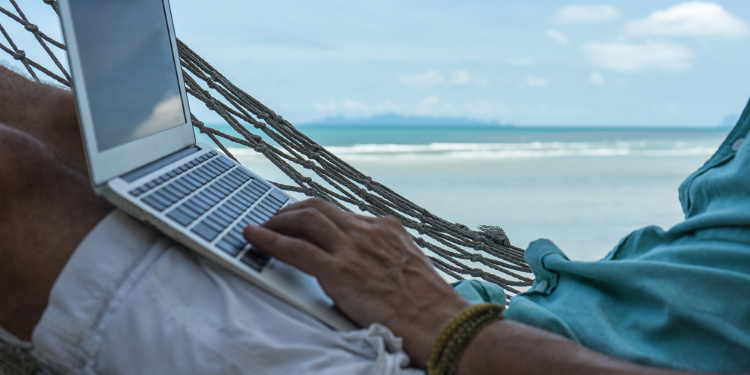
Travel writing isn't all about travelling exotic destinations around the world, staying for free in luxury hotels and sipping delicious cocktails in a hammock with a laptop on a pristine beach. Jerry Nelson, an American expat in Buenos Aires and passionate writer, debunks the myth of travel writing.
Tom Johnson's eyes dilated, and his heart raced in anticipation. He opened his email and the answer, hopefully, stared back at him.
“Make Thousands of Dollars and Travel Free as a Travel Writer,” said the subject line.
Tom found himself in the unenviable position as having to cut back on expenses. For the last three-years, Tom had lived a first-world lifestyle in a developing market nation. As an American expat in Spain, Tom had it made.
Then the bottom fell out.
As the pandemic circled the globe, Tom's company began furloughing employees. Although protected, at first, by his remote work position, he was eventually forced to tighten his belt and finally downsizing reached him in Malaga.
After several months of cutting back on expenses, the email arrived, and Tom gladly signed up for a $19.00 a month course on how to be a freelance travel writer.
But he soon found the ancient promises were empty and travel writing would not be his financial saviour.
Sadly, Tom isn't alone in being victimised by extravagant promises. What appears to be sound guidance on the surface often falls apart with more in-depth research.
Instead of giving up, use the seed of Tom's experience to explore not just what you should do but to find what feels right (and more genuine) to you.
What it's really like to be a Travel Writer
Nearly everyone has a skewed idea about the travel writer life.
The most popular perception is that we bounce around Europe's most romantic destinations, or perhaps in Asia's exotic islands. And we stay for free in luxury resorts and villas, pampered with spa treatments, and being force-fed the finest culinary delights.
Some might think we're regularly escorted on private guided tours of the best tourist attractions by attentive PR reps who cover our every expense.
Yet others believe we hop between Thailand, Estonia, Brazil or Argentina, hanging out in trendy cafes, surrounded by other digital nomads.
Many might think we spend our days sipping coffee while our fingers dance around our keyboards, churning out posts and prose that will delight our avid tribe of magazine editors, fans, and followers.
Then, at the end of each idyllic day, we flop out in a hammock under the palms, looking out over a pristine beach as we take in the sunset. We'll write our travel stories with a fruity cocktail or frosted beer in hand, while somehow balancing our laptops - all at the same time.
While I've never written a story perched in a hammock on the beach, I regularly endure many of these other perks as part of my job. These scenarios are really the icing on the cake for a travel writer. When all my hard work comes together, for a few days or weeks, I get to live far above my station in life.
Ninety per cent of the travel writing iceberg remains below the water. That's where the real work happens. It's far less exciting and much more mundane!
To live the good life for a few months each year, many would regard my daily tasks as pure drudgery.
Travel writing is a job, like any other. It's not all beer and skittles, as my Kiwi and Aussie friends would say. We work for those travel perks!
Behind the scenes
Spending mind-numbing hours online, and thumbing through Writer Market, tracking down magazines for my distribution list
Writing and sending out hundreds of query letters to editors, pitching my latest story ideas
Working long and hard cranking out publishable copy with multiple deadlines hanging over my head
Sending completed manuscripts to destination marketing PR reps for fact-checking
Scanning through previously published articles to see what I can re-sell to earn the most income for every article
Suffering through interminable flights and the subsequent jet lag at each destination. Then, trying to appear intelligent when I'm interviewing someone while I'm still jet-lagged.
Sending out polite Request for Travel Assistance emails (RTA) to Destination Marketing Organizations (DMOs), asking for complimentary accommodations, meals, entry to tourist attractions, guides, transport, because my paid assignments don't cover my travel expenses
Showing genuine interest and appreciation on Fam(iliarisation) Tours even when I'm not real thrilled about a particular attraction
These are just a few of the many routine tasks needed to eke out a crust as a freelance travel writer. It is the price we pay for those few months of carefree, glamorous travel!
If you're launching a travel writing career, read this article after about a year on the road as a travel writer and tell me if I'm lying.
The takeaway
Freelancing, travelling, and being an expat can be combined in countless ways. To avoid being another scam victim, spend some time and do some research and planning before you set out. The time spent will serve you well.
Never forget who your “customers” are. The buyers of what you are selling as a freelancer are editors. If they don't want to publish your material, your creative ideas will never go beyond your journal or your letters home.
As a blogger, your customers are your regular readers, but also the tourism boards or brands that can give you work. Realise that if you're not comfortable marketing yourself and your ideas, this is not for you. Being a travel writer or blogger, at least until you're established, is 90 per cent marketing, 10 per cent writing.



















